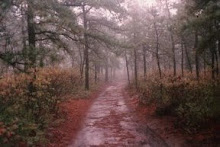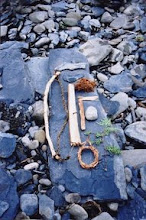
One of the things that sometimes surprises people when they start the Earth Skills Course is the emphasis on learning trees. There are journals, observations, sketching and descriptions. There is ample time for field study dedicated to our tall forest brethren.
Of course, once you stop and think about it, trees are so crucial, so vital and so amazing, you realize that it would be virtually impossible to get close to nature, using native skills, without learning and getting to know them.
Right now, we are tapping four maple trees for sap, and we are literally drinking the sweet blood of those trees. I am cutting the beams for the camp cabins, which are white pine and tamarack, and carving pegs of red maple, oak and white ash to hold the frame together. Barry Keegan, our head instructor, has probably about 200 hickory, elm and locust bow staves seasoning in our barn, and our Earth Skills Semester students just cut some white cedar that had fallen in the last storm to dry for coal burning, bow drills and hand drill fires.
We burn cherry, beech, birch and sugar maple in our wood stoves, to keep us warm, and carve traps from viburnum, nannyberry and buckthorn. Cedar and aspen make great fire boards for making friction fires, and tulip poplar bark is awesome for tinder bundles. I could go on and on and on....
It isn't easy learning about trees you don't know at first. I mean, you have to use field guides and then learn to observe very closely things that most people miss. How does the leaf attach to the twig? What is the predominant bark pattern and color? Is there a unique signature shape to the way the tree grows? How does it smell and feel? (The bark, leaves and branches.) All of these come with time spent studying, observing and living with them every day, or as much as you can accomplish with them on your field trips and camp outs.
One thing I have discovered is that you can't learn much about a person if you don't spend any time with them. Well, the same is true for trees. You have to carve the wood. Use it to pound stakes or split firewood. Burn it and see how long it lasts. Bend it for a bow, coal burn it for a throwing stick or spoon. Sit under it and see how the light and shadows play against your skin. Listen to see which birds like to creep upside down along the bark, searching for caterpillars, sap or hollows to build a nest.....
If you find you are having trouble getting motivated in learning as much as you can about your trees, just imagine what our survival would be like without wood. Without shade, oxygen and protection. It always makes me appreciate their steadfast help, their beauty and their friendship in my times of need.
The least I can do is learn as much as I can about them!
On the other hand, it can still be intimidating!
If that is the case, try heading out to a botanical garden, and call ahead to find a time when one of the staff is free for a tour. Maybe you would like to volunteer for an afternoon, in exchange for additional learning. Usually, they can introduce you to a ton of different trees and help you see their differences side by side, and give you a first hand look, without getting you caught up in field guide anxiety.
Any of you out there reading this have any tips to share with the rest of the readers? Feel free to comment and let us in on your secret easy way to get to know our trees! Or just let me know if this post was helpful in any way.
Have a great day! I am off to boil down the sap for some sweet maple syrup!













No comments:
Post a Comment